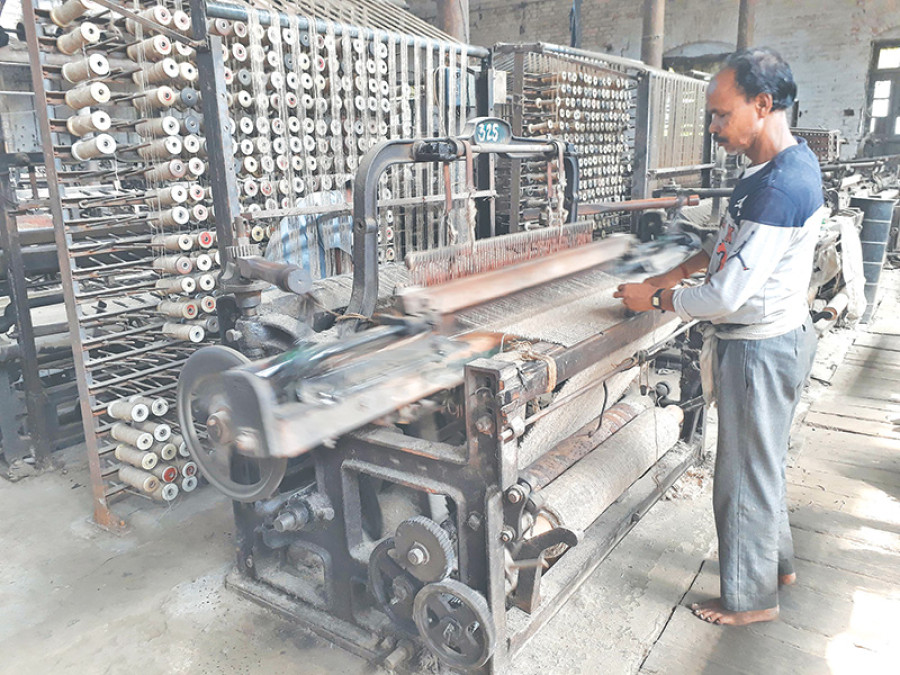Wed, Feb 25, 2026
Money
Biratnagar Jute Mills restarts making sacks after a decade
Biratnagar Jute Mills, the oldest factory in the country, resumed producing twine and jute sacks after a decade-long hiatus. It started manufacturing sacks on Sunday after the machines started running again on September 11.
bookmark
Deo Narayan Sah
Published at : November 8, 2018
Updated at : November 8, 2018 08:57
Morang
Biratnagar Jute Mills, the oldest factory in the country, resumed producing twine and jute sacks after a decade-long hiatus. It started manufacturing sacks on Sunday after the machines started running again on September 11.
One out of the more than 200 looms used to weave jute sacks has been switched on, according to Basanta Ban, chairman of the jute mill. The management said another loom would be put into operation soon.
The venerable factory, established in 1937, is currently producing twine, jute wrappers and jute skin sacks used for packaging different goods. “We are working for the sustainable operation of the mill in a full-fledged way,” said Ban.
“We have purchased 2,800 bobbin carriers and jute to operate the factory at full capacity.”
According to mill administrator Tara Nath Timisina, the factory is in a position to operate all the looms. “In order to operate all the looms, we need raw materials, spare parts and technicians and other human resources. We need Rs80-100 million to manage all these resources and go into full-scale production,” said Timisina. “We have been successful in operating several looms to produce jute sacks within two months of restarting operations, and we are confident that we will be able to run the factory at full capacity soon.”
After resuming operation, the factory has produced around 40 tonnes of twine which is ready for sale, according to factory officials. “Apart from twine, the factory is producing jute yarn which is used to weave sacks,” said Suchendra Jha, wastage quality control in-charge of the mill. “Our plan is to repair the machines installed at the mill gradually, and operate the mill at full capacity.”
Currently, 80 labourers and technicians are working eight-hour shifts daily. If the mill is operated at full capacity, it will provide employment to around 5,000 labourers and technicians.
After the factory shut down a decade ago, the shareholders repeatedly tried to bring it back into operation, but they were not able to do so. This time, Chairman Ban was able to bring the factory back to life to produce twine and jute sacks.
Ban is planning to hold a shareholder meeting to put together the capital necessary to operate the factory at full capacity. “If we can create a favourable environment, the shareholders of the company will readily inject much needed cash to run the factory in a full-fledged way,” he said.
Most Read from Money
Upper house passes tourism bill with tougher Everest rules
Nepal’s share market faces unprecedented lockdown as regulators battle industry over trading rules
Cooking gas shortage persists in Valley ahead of polls
Gold, silver prices rise
Nepal clears way for E10 petrol blend, eyes Rs6 bn yearly savings
Editor's Picks
Upper house passes tourism bill with tougher Everest rules
What Routine of Nepal Banda gets right, and what it gets wrong
The murky business of room finding in Kathmandu
Nepal’s share market faces unprecedented lockdown as regulators battle industry over trading rules
Ministries differ over extending Indian HICDP aid beyond local governments
E-PAPER | February 25, 2026
×




 9.15°C Kathmandu
9.15°C Kathmandu-(1).jpg)













